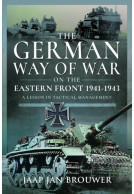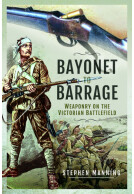The German Way of War (ePub)
A Lesson in Tactical Management
Imprint: Pen & Sword Military
File Size: 22.4 MB (.epub)
Pages: 240
ISBN: 9781526790385
Published: 9th February 2021
| Other formats available | Price |
|---|---|
| The German Way of War Paperback Add to Basket | £14.99 |
| The German Way of War Hardback Add to Basket | £25.00 |
The German Army lost two consecutive wars and the conclusion is often drawn that it simply wasn't able to cope with its opponents. This image is constantly reinforced in literature and in the media, where seemingly brainless operating German units led by fanatical officers predominate. Nothing was as far from the truth. The records show that the Germans consistently outfought the far more numerous Allied armies that eventually defeated them: their relative battlefield performance was at least 1.5 and in most cases 3 times as high as that of its opponents.
The central question in this book is why the German Army had a so much higher relative battlefield performance than the opposition. A central element within the Prussian/German Army is Auftragstaktik, a tactical management concept that dates from the middle of the nineteenth century and is still very advanced in terms of management and organization.
Using more than fifty examples to illustrate the realities of the battlefield, from North Africa to Arnhem and the Hürtgen Forest, the author explains why the Prussian/German Army was such an unprecedented powerful fighting force. And why Auftragstaktik – under other guises – is still the basic form of operation for many European armies, with even the US Army introducing certain elements of Auftragstaktik into its organization, more than 150 years after its conception.
www.germanarmy.eu
“new and noteworthy" as featured in
WWII History Magazine
“Enjoyed it.”
Historical Miniatures Gaming Society, June 2024
Read the full review here.
An interesting book because of its great detail and technical analysis into the strengths and tactics of the German Army in WWII.
Adrian Greaves - The Anglo-Zulu War Historical Society
From the title I had expected to learn something about the actual German way of war and indicate what made the German military so different from the armies of other nations. I was interested to see if the author could somehow explain how it was that the invading German military could be so ruthless to the point of willingly participating in the mass killings of subjugated civilian populations, including harmless women and children – but this is not relevant to this technical book.
The clue to this book’s subject is in the sub title because this is what the book is about. Relevant are command concepts, battlefield tactics, training methods and leadership. I was intrigued by the chapter three sub heading ‘The British Army: an army without a brain’ but this is understandable as it is written by a Dutch management consultant seeking new dynamics in the history of warfare.
He has achieved what he set out to convey to his readers. It is thoughtful and well written and will attract readers seeking to understand the role of such concepts in the art of battlefield management.
"as auftragstaktik is the cornerstone of our mission command philosophy, those looking for more context on the concept should take the time to read this book."
ARMOR Magazine, Fall 2021
"...a book that is not hobbled by doctrine or predetermined frameworks."
Military Review
Read the review here
This is a specialist book, which provides a fascinating account of the German army performance in both World War One and Two. A key theme of the book queries why the German army had a higher battlefield performance than the opposition, and a synopses on how tactical management was advanced, and so organised. Its content takes an in-depth sweep at aspects such as defeat being a basis for learning, Command Concept, structure, leadership, men, training, as well as shared values and the reality of the battlefield. The key to the Germany army’s successes was its modern combat doctrine and leadership style.
Jon Sandison
This was a fascinating book looking at the way the German Army went about training its units and men but not the basics, it was interested in psychology and finding the right men in order to get the most out of them. It’s no surprise to find the German Army was like this as there is a dominant thought today that German workers work comprehensively and well and why German products are manufactured to the nth degree. The book is supported by about 50 case examples which really do prove the point of the book, and I wouldn’t be surprised if this isn’t how most armies or even businesses work now in order to get the best from their workers. I would say that if you are interested in World War Two history, this would be an important book that you might otherwise have passed over. It really does show how a decent army could be the best army. This is a book I would certainly recommend to everyone. Certainly ideal for a student of history. I must say the blog post on the Pen & Sword website was also excellent.
UK Historian
Read the full review here
The book I am presenting to you therefore stands out for the substantial depth of analysis of the German military organization and its merits, which was demonstrated in the exemplary performance on all fronts of its troops, even those with little training. The flexibility and unity of the concepts taught meant that even variegated units could be temporarily united as "Kampfgruppen" (this organizational concept is also analyzed) that in their performance in battle would have had nothing to envy to organic units. The book also examines the values and psychology of the forces at play, the Germans' often mistaken for "fanaticism", but in reality only a very high professionalism in carrying out what was a task. Thus the book is extremely interesting and valid and cannot miss on the shelves of fans and historians of the Second World War and beyond.
On The Old Barbed Wire
Read the full Italian review here
Reading the case studies in this context will effect your view on some of these battles, at least it has for me.
Medieval Sword School
This will be a book I read over again.
Read the full review here
About 2006 I was a co-founder of a leadership start up that placed the principles of Aufstragstaktik at the centre of the product. There is no question that the German approach was exceptionally effective and produced results that were positive. Management and leaders focusing on ‘what’ is to be achieved rather than ‘how’ is fundamental. Unfortunately, many businesses have been conditioned to rely on process to simplify activity (‘how’) rather than to see the value in people being able to form solutions to changing circumstances because they were aware of ‘what’ the objective was and could therefore formulate an effective response. This results in people who become reluctant to be innovative because the constraint of process becomes dogma. The entrepreneurial benefits of Auftragstaktik are undeniable but the courage to embrace the doctrine is usually lacking as it requires a deep understanding and true cooperation.
Michael McCarthy
This book clearly describes how the German Army consistently over achieved because it’s doctrine of tactical management made the very best use of its resources by pushing decision making down within a framework of direction rather than plans. This explains how small numbers of informed German soldiers could achieve significant success against the odds. This is a good read for anybody wanting more depth of information on how the doctrine enabled the German Army to be able to maintain itself against significantly larger numbers of Allied troops and how the vital role of leadership (at all levels) made it possible.
Michael McCarthy. Battlefield Guide
About Jaap Jan Brouwer
Jaap Jan Brouwer studied Medicine, Law and History at Groningen University in The Netherlands. He has been a management consultant for more than 30 years and has written books on general management topics, health care, the Dutch industry and on military organisations.
He has a thorough knowledge and expertise on organisations and warfare, particularly the Second World War. His way of looking at military organisations provides a new, intriguing context and introduces new dynamics in the history of warfare, allowing the reader to understand why military organisations acted and reacted as they did. More information on the book can be found at www.auftragstaktik.eu.


















